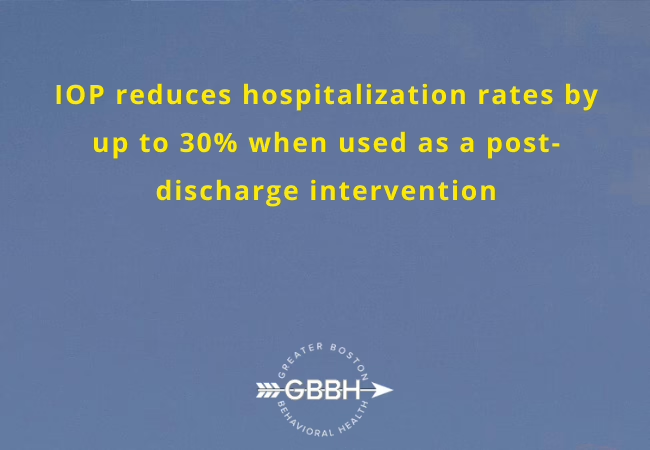Mental health and addiction recovery are not one-size-fits-all journeys. Everyone experiences healing differently, and choosing the right level of care is crucial to success. For individuals who need more support than traditional therapy—but don’t require 24/7 supervision—an Intensive Outpatient Program (IOP) offers a powerful solution.
At Greater Boston Behavioral Health, our Intensive Outpatient Program in Massachusetts serves individuals who are ready to rebuild their lives through therapy, accountability, and structure—while still managing everyday responsibilities. Whether you’re stepping down from a Partial Hospitalization Program in Massachusetts, or avoiding a potential relapse, IOP can help you regain control of your life while receiving high-quality care.
What Is an Intensive Outpatient Program (IOP)?
An Intensive Outpatient Program (IOP) is a structured treatment plan that combines multiple weekly sessions of therapy, group support, and psychiatric care. Unlike inpatient or residential treatment programs in Massachusetts, IOP allows individuals to live at home and maintain work or school responsibilities while participating in treatment during the day or evening.
IOP typically includes:
- 3 to 5 days of programming per week
- 3 to 4 hours per day of structured therapeutic services
- Group therapy, individual counseling, and psychiatric services
- Specialized tracks like trauma recovery and anger management therapy in Massachusetts
- Life skills development, relapse prevention, and psychoeducation
Top Benefits of Choosing an IOP for Recovery
1. Offers Structure Without Requiring Inpatient Commitment
Not every person in recovery needs to live in a treatment facility. IOP delivers hospital-level care in a flexible outpatient format. Clients receive regular clinical support, structure, and accountability—without stepping away from their homes, families, or communities.
It’s an ideal step-down from an inpatient treatment program in Massachusetts or a residential treatment program in Massachusetts for those who are stable but still in need of focused care.
2. Preserves Daily Life Responsibilities
One of the greatest challenges in seeking mental health or addiction care is balancing it with life. IOP allows you to:
- Continue working or going to school
- Fulfill parenting and caregiving responsibilities
- Stay active in your community
- Avoid the disruption and stigma of hospitalization
With morning, afternoon, and evening sessions available at our mental health treatment center in Massachusetts, we make sure treatment fits your life—not the other way around.
3. Provides High-Level Clinical Care
Greater Boston Behavioral Health delivers comprehensive care through our mental therapy programs in Massachusetts, including:
- CBT and DBT: Reshape thinking and behaviors
- Trauma-focused care: Heal from PTSD and adverse experiences
- Relapse prevention planning: Identify and respond to triggers
- Group and individual therapy: Address emotional, psychological, and behavioral challenges
- Psychiatric evaluations and medication management
We treat the person—not just the symptoms—with an individualized plan that evolves alongside your progress.
4. Supports Smooth Transitions Between Levels of Care
If you’re leaving a partial hospitalization program in Massachusetts, jumping straight into weekly outpatient therapy can feel like a big leap. IOP serves as a transitional step that keeps structure in place while preparing you for long-term independence.
Our clinical team ensures your journey flows seamlessly between levels of care—including inpatient, PHP, IOP, and outpatient support.
5. Reinforces Skills in Real Time
Because you return home after each IOP session, you can immediately apply the skills you’ve learned. This real-world practice deepens the effectiveness of:
- Emotion regulation
- Stress and anxiety management
- Communication and boundary-setting
- Conflict resolution and decision-making
- Sobriety maintenance (for those in addiction recovery)
You then return the next day to reflect on what worked—and what didn’t—with your clinical team.
6. Strengthens Peer Connection and Community Support
Group therapy is the heartbeat of IOP. It helps clients:
- Recognize shared experiences
- Reduce feelings of isolation or shame
- Learn from others’ progress and mistakes
- Build healthy, meaningful connections
For many, these relationships are just as healing as therapy itself.
7. Includes Specialized Tracks for Co-Occurring Needs
Mental health rarely exists in isolation. Many clients at our center face multiple challenges at once. Our mental health programs in Massachusetts offer integrated support for:
- Dual diagnosis: Substance use + mental health conditions
- Trauma recovery
- Anger management therapy in Massachusetts for emotional reactivity, aggression, or impulse control
- Bipolar disorder, depression, anxiety, PTSD, OCD, and more
Treatment is personalized—not standardized—so every client gets what they need most.
8. Enhances Long-Term Recovery Outcomes
Studies show that IOP participants are significantly less likely to relapse or return to crisis-level care. Why?
- They stay engaged in their recovery
- They build healthy routines
- They’re equipped with emotional regulation tools
- They maintain a strong therapeutic alliance with providers
In fact, over 70% of clients report measurable improvement in functioning and quality of life after completing IOP programs, according to the Journal of Psychiatric Services.
9. Prevents Hospitalization and Relapse
For individuals showing signs of a mental health crisis or substance relapse, IOP can serve as an early intervention tool. Instead of waiting until symptoms become unmanageable, IOP provides:
- Increased structure and accountability
- Daily symptom tracking and feedback
- Clinical crisis support
- Reconnection to therapeutic community
This prevents the need for emergency care or inpatient hospitalization—saving time, money, and emotional strain.
10. Empowers You to Reclaim Independence
Recovery is not just about surviving—it’s about thriving. IOP helps clients return to life with:
- Confidence in their ability to manage symptoms
- Practical coping skills
- Clear goals and direction
- A solid support system
- Insight into personal strengths and triggers
IOP gives you the structure to heal—and the flexibility to live.
How IOP Fits into a Continuum of Care
| Level of Care | Treatment Format | Ideal For |
|---|---|---|
| Inpatient Treatment | 24/7 residential care | Psychiatric emergencies, detox, suicidal ideation |
| Residential Treatment | 24/7 structured support | Addiction recovery, severe trauma, extended therapeutic work |
| Partial Hospitalization Program (PHP) | 5–6 hrs/day, 5 days/week | Transition from inpatient, step-down from crisis stabilization |
| Intensive Outpatient Program (IOP) | 3–4 hrs/day, 3–5 days/week | Continuing care, relapse prevention, return to daily living |
| Outpatient Therapy | 1–2 hrs/week | Long-term maintenance, mild symptoms, post-IOP recovery |
Why Choose Greater Boston Behavioral Health?
At Greater Boston Behavioral Health, our Intensive Outpatient Program in Massachusetts is:
- Evidence-based: We use gold-standard therapies like CBT, DBT, trauma-focused care, and motivational interviewing
- Led by experts: Experienced clinicians, psychiatrists, and recovery coaches
- Flexible and accessible: Virtual or in-person options to support your lifestyle
- Inclusive and affirming: LGBTQ+ friendly and trauma-informed
- Part of a full continuum: Smooth transitions between inpatient, PHP, IOP, and outpatient levels
We work with you—not just your diagnosis—to ensure recovery is sustainable, empowering, and personalized.
Take the Next Step Toward Recovery
If you’re ready for real change but not ready to pause your entire life, our Intensive Outpatient Program in Massachusetts may be the ideal path forward.
Call Greater Boston Behavioral Health today at 888.278.0716 to schedule a confidential consultation and explore all our mental health programs in Massachusetts. You don’t have to do it alone. Let’s walk the path to recovery—together.
FAQ Intensive Outpatient Program (IOP)
What makes an Intensive Outpatient Program different from inpatient care?
IOP allows individuals to live at home while attending structured therapy multiple days a week. In contrast, inpatient care requires 24/7 residence at a facility. IOP is ideal for those who need more than outpatient therapy but don’t require full-time supervision.
How many hours per week does IOP typically involve?
Most IOPs include 9 to 20 hours per week of structured therapy and support services, divided across 3 to 5 days per week in 3–4 hour sessions.
Is IOP effective for treating both mental health and substance use disorders?
Yes. IOP is especially effective for dual diagnosis treatment, offering integrated support for individuals managing both a mental health condition and substance use. Greater Boston Behavioral Health specializes in co-occurring care.
How does IOP support family and work life?
Our Intensive Outpatient Program in Massachusetts offers flexible scheduling (mornings, afternoons, and evenings), so clients can continue working, parenting, or attending school while still engaging in intensive treatment.
Can IOP prevent the need for hospitalization?
Absolutely. IOP provides early intervention for individuals showing signs of relapse or emotional deterioration, often preventing inpatient admissions through timely, structured care.
What mental health conditions are treated in IOP?
IOP is effective for treating a wide range of conditions including depression, anxiety, PTSD, bipolar disorder, OCD, emotional dysregulation, and behavioral issues such as anger management, all supported by our mental health programs in Massachusetts.


